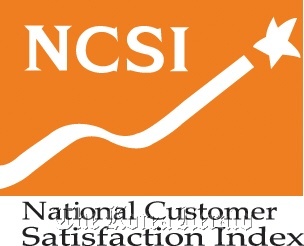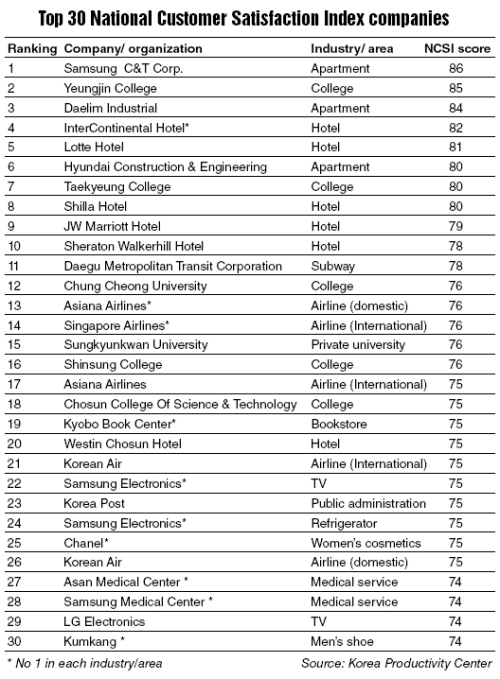Five-star hotels, technical colleges also receive good marks for consumer-tailored services
Samsung C&T Corp., known for its apartment brand “Raemian,” acquired the highest rating in a national consumer satisfaction survey last year, the Korea Productivity Center said on Tuesday.

Yeungjin College and Daelim Industries Co. garnered the second and third places, respectively.
The survey of 65,427 consumers for 248 corporations and institutions, including colleges and state-run firms, was carried out jointly by KPC and University of Michigan. The survey, which covers 56 industries, adopted the National Customer Satisfaction Index model.
Last year’s average NCSI was 72.3, up 1.7 points or 2.4 percent from 2009’s 70.6. KPC attributed this to an improvement in consumer satisfaction throughout most industries thanks to a recovering economy as well as firms’ avid consumer satisfaction activities.
Some good examples of the latter are characterized by five hotels ― Intercontinental Hotel, Lotte Hotel, Hotel Shilla and JW Marriot Hotel ― all of which were ranked in the top 10, KPC said. They made efforts to identify the factors which cause consumer complaints and to correct them.
Apartment builders and institutions included in the top 10 concentrated on their core values to win consumer satisfaction, KPC said.
Samsung C&T Corp., Daelim Industries co. and Hyundai E&C offered original customer services despite the sluggish local property market, thus receiving favorable responses from them while also compensating for the decline in their property value, KPC said.
Post-secondary schools Yeungjin College and Taekyeung College also obtained good marks following 2009, by providing students with diverse self-development and job-preparation programs, and extensive scholarship opportunities.
Samsung C&T Corp., known for its apartment brand “Raemian,” acquired the highest rating in a national consumer satisfaction survey last year, the Korea Productivity Center said on Tuesday.

Yeungjin College and Daelim Industries Co. garnered the second and third places, respectively.
The survey of 65,427 consumers for 248 corporations and institutions, including colleges and state-run firms, was carried out jointly by KPC and University of Michigan. The survey, which covers 56 industries, adopted the National Customer Satisfaction Index model.
Last year’s average NCSI was 72.3, up 1.7 points or 2.4 percent from 2009’s 70.6. KPC attributed this to an improvement in consumer satisfaction throughout most industries thanks to a recovering economy as well as firms’ avid consumer satisfaction activities.
Some good examples of the latter are characterized by five hotels ― Intercontinental Hotel, Lotte Hotel, Hotel Shilla and JW Marriot Hotel ― all of which were ranked in the top 10, KPC said. They made efforts to identify the factors which cause consumer complaints and to correct them.
Apartment builders and institutions included in the top 10 concentrated on their core values to win consumer satisfaction, KPC said.
Samsung C&T Corp., Daelim Industries co. and Hyundai E&C offered original customer services despite the sluggish local property market, thus receiving favorable responses from them while also compensating for the decline in their property value, KPC said.
Post-secondary schools Yeungjin College and Taekyeung College also obtained good marks following 2009, by providing students with diverse self-development and job-preparation programs, and extensive scholarship opportunities.

By industry, the average index for local electronics industry marked 72 points, same as that of 2009. That for the telecommunications industry went down for all sectors except mobile communications services which managed to pull off an increase of 3 points thanks to the huge popularity of smartphones.
For the local finance industry, on the other hand, all sectors but insurance had elevated NCSI indices than the year before due to the economy and stock prices which has been bouncing back.
The KPC report also showed that apartments, large bookstores and air carriers showed high customer satisfaction and consequent high customer retention ratings.
For subway and gas stations, a high customer retention rate despite low customer satisfaction was shown as consumers tend to keep using them due to price and geographical merits, KPC said.

The KPC introduced the NCSI in 1996 to strive for stronger customer satisfaction and foster innovative corporate management.
The NCSI index considers the assessment of customer expectations, perceived quality, perceived value, overall satisfaction, customer complaints, consumers’ loyalty and retention ratio. The survey covers not only domestic but foreign brands.
Because the index has its base on American Consumer Satisfaction Index, which was first invented by University of Michigan in 1994, it can conveniently be compared with those of 16 other counties which are based on ACSI.
“The NCSI is the most reliable and important customer satisfaction index for companies and consumers, and has gained the reputation of being an indispensable resource for enhancing customer satisfaction,” KPC officials said.
The KPC also addressed the significance of the index, saying that it is closely related to the price index of stocks and unemployment rate. The correlation index between NCSI and price index of stocks was 0.778 while that between the index and unemployment rate stood at -0.879, according to the report.
The increase or decrease in NCSI tends to influence the performance of firms, which is represented by stock price indices, accordingly and vice versa. Unemployment rate is in inverse ratio to the index, according to KPC, with one going up resulting in a decrease in the other.
The NCSI can thus function as a leading indicator for forecasting the outlooks for stock indices and unemployment rates, KPC officials said.

“The NCSI is proven to be closely related to the country’s economic circumstances. In order for firms to perform better, they have to invest more on boosting consumer satisfaction even during recessions,” KPC chairman Choi Dong-gyu said.
“We will continue to try to improve the completeness of the NCSI so that it can function better as a leading economic indicator.”
By Koh Young-aah (youngaah@heraldcorp.com)









![[Hello India] Hyundai Motor vows to boost 'clean mobility' in India](http://res.heraldm.com/phpwas/restmb_idxmake.php?idx=644&simg=/content/image/2024/04/25/20240425050672_0.jpg&u=)









